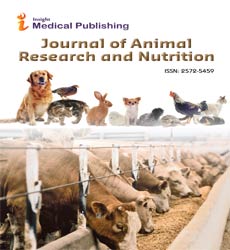Abstract
Assessing Protein Value of Cassava (Manihot Esculenta Crantz) Leaf Meal: Effect on Feed Intake, Growth Performances and Carcass Characteristics of Potchefstroom Koekoek Chicken
A 115-days feeding trial was conducted on 225 Koekoek day-old chicks at DubboMante experimental site of AARC in a completely randomized design to evaluate feed intake, growth performance and carcass yield of Potchefstroom Koekoek chicken fed cassava leaf meal at dietary levels of 0, 3, 6, 9 and 12 in T1, T2, T3, T4 and T5respectively. The experiment lasted for 13 weeks after two weeks of brooding period. Feed intake and body weight were measured in a daily and weekly basis, respectively. At the end of the experiment, two chickens (cockerel and pullet) per replicate of each treatment were randomly selected, fastened overnight, weighed and slaughtered for measurements of carcass traits. Final body weight and daily body weight gain were higher for T1 [837.91 g and 8.22 g/day, respectively] with no significant difference [p>0.05] between T2, T3, T4 and T5. Chickens kept under T1 [837.91 g and 8.22 g/day] and T2 [788.47 g and 8.17 g/d] were similar in these parameters. Feed conversion ratio were unchanged [p>0.05] across the treatments. Non- significant [p>0.05] differences were observed in slaughter weight, Breast, Drumstick, Thigh, Back, wing, total carcass across and dressing percentage across the treatments. Sex had significantly [p<0.001] affected both daily body weight gain and final body weight of birds. Male chickens gain more during the experimental period and thus achieved a higher body weight at the end. Neither mortality nor health problem was caused by Cassava leaf meal. Hence the results of this study revealed that inclusion of Cassava leaf meal up to 12% can be incorporated in a starter and grower diets of dual-purpose chicken without a marked detrimental effect on the growth as well on the carcass quality parameters.
Author(s):
Aman Getiso, Mebratu Asrat , Etalem Tesfaye
Abstract | Full-Text | PDF
Share this

Google scholar citation report
Citations : 764
Journal of Animal Research and Nutrition received 764 citations as per google scholar report
Abstracted/Indexed in
- Google Scholar
- China National Knowledge Infrastructure (CNKI)
- WorldCat
- International Committee of Medical Journal Editors (ICMJE)
- Secret Search Engine Labs
Open Access Journals
- Aquaculture & Veterinary Science
- Chemistry & Chemical Sciences
- Clinical Sciences
- Engineering
- General Science
- Genetics & Molecular Biology
- Health Care & Nursing
- Immunology & Microbiology
- Materials Science
- Mathematics & Physics
- Medical Sciences
- Neurology & Psychiatry
- Oncology & Cancer Science
- Pharmaceutical Sciences

